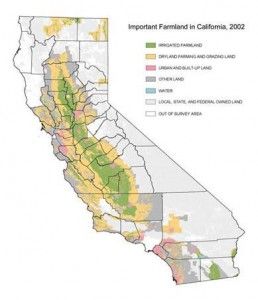New Warming Bill Would Hit CA Farmers
by CalWatchdog Staff | April 5, 2011 9:01 am
 [1]APRIL 5, 2011
[1]APRIL 5, 2011
By KATY GRIMES
California farmers soon could face strict compliance with AB 32, the Global Warming Solutions Act of 2006[2].
Using the controversial argument that climate change will have a substantial impact on agriculture in California, SB 237[3] by Sen. Lois Wolk, D-Davis, would be implemented by “an unspecified agency,” according to the bill’s wording. That could mean a current agency, such as the California Air Resources Board, or a new agency.
The bill would use “market-based compliance mechanisms for the reduction of emissions of greenhouse gases.” That means the “unspecified agency” would create something like the carbon “cap-and-trade” trading mechanism[4] in AB 32.
According to the bill’s summary[5]:
Warming temperatures also threaten to shift the kinds of crops that can be grown in the state. Statewide, the impact of climate change on California agriculture could hamper food and fiber production.
The bill was heard Monday in the Senate Committee on Environmental Quality. It is sponsored by the California Climate & Agricultural Network[6]. On its website, CalCAN[7] states, “SB 237 [8]will assure that future revenue generated by the state’s climate change law designated to agriculture will be spent on climate-friendly sustainable agriculture practices.”
CalCAN is a coalition of sustainable farming and agriculture organizations “seeking policy solutions to incentivize agricultural research and practice that have climate benefits,” its website states.
Research funded by the state California Energy Commission found that “some agricultural practices not only reduce GHGs [greenhouse gases], but may also sequester atmospheric carbon in the soil.” That may seem like good news. But it appears to be a primary talking point for this bill, justifying the greenhouse gas emissions regulations on farmers because supporters believe that sustainable farming is better for the environment.
For all of the talk about concern for greenhouse gas emissions, the point of the bill seems to center on the formation and funding of a new advisory panel, research and studies, as well as naming which state agency would head up the new advisory committee.
Three Goals
The three stated goals in SB 237[9] are:
• Research and demonstration to examine the farming practices and systems that reduce greenhouse gas emissions, sequester atmospheric carbon and adapt to climate change.
• Technical assistance for producers that communicates research findings into real opportunities for California agriculture to provide voluntary GHG reductions and adaptation activities.
• Incentives to overcome barriers to agricultural practices that mitigate and adapt to climate change while providing environmental and health co-benefits, including improved air and water quality, enhanced wildlife habitat and water conservation.
The bill analysis reads: “In a state where water is already scarce, climate change scenarios predict that water supplies will become increasingly constrained.”
That’s a giant leap about water supply after a record-breaking wet winter. There have been several news reports recently about California being ill prepared for water storage and runoff. Yet the state has the water to capture that water, but does not. And many believe that the scarcity of water for agriculture is political.
Previous Bills Vetoed
According to one environmental expert at the Capitol, two prior bills were almost identical to SB 237[3]: AB 1241 and AB 1404.
Off the record, the expert said that the veto message from former Gov. Arnold Schwarzenegger for AB 1404 explained a great deal. The bill would have strictly limited the use offset credits in California’s global warming program. Schwarzenegger wrote:
This bill limits a regulated entity’s use of greenhouse gas (GHG) emission compliance offsets to no more than ten percent of its GHG reductions achieved through market mechanisms during any given compliance period.
In her message to the committee on Monday, Wolk said the criticism of previous bills was that they were premature, and funding was an issue. “The timeline of the last bill was the issue.… and it was held in Appropriations. This is no longer the case,” she said.
Opponents to SB 237[9] think that it’s still premature.
A representative from the California Chamber of Commerce questioned the appropriateness of the bill at this time, and said that it “seeks to spend money that does not exist, and may not ever exist.”
Dorothy Rothrock with the California Manufacturers and Technology Association echoed the Chamber’s opposition. She also expressed an additional fiscal concern that the bill gives the California Air Quality Board the power to raise funds and charge fees, which Rothrock said may in fact really be taxes.
“I don’t think AB 32 gives the Air Resources Board the power to raise funds,” Rothrock said. “There needs to be a clear nexus of fees, and the use of fees.”
Surprisingly, there were no questions from committee members to Wolk about the bill. The committee passed the bill from the committee on a party-line vote.
- [Image]: http://www.calwatchdog.com/wp-content/uploads/2011/04/Farmland-California-2002.jpg
- AB 32, the Global Warming Solutions Act of 2006: http://en.wikipedia.org/wiki/Global_Warming_Solutions_Act_of_2006
- SB 237: http://info.sen.ca.gov/pub/11-12/bill/sen/sb_0201-0250/sb_237_bill_20110329_amended_sen_v98.pdf
- “cap-and-trade” trading mechanism: http://en.wikipedia.org/wiki/Global_Warming_Solutions_Act_of_2006
- summary: http://www.calclimateag.org/wp-content/uploads/2011/03/Fact-Sheet-SB-237.pdf
- California Climate & Agricultural Network: http://www.calclimateag.org/
- CalCAN: http://www.calclimateag.org/about/our-team/
- SB 237 : http://info.sen.ca.gov/pub/11-12/bill/sen/sb_0201-0250/sb_237_bill_20110329_amended_sen_v98.pdf
- SB 237: http://info.sen.ca.gov/pub/11-12/bill/sen/sb_0201-0250/sb_237_bill_20110329_amended_sen_v98.pdf
Source URL: https://calwatchdog.com/2011/04/05/new-warming-bill-would-hit-ca-farmers/